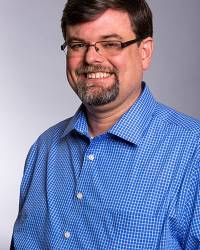Interview with Social Principles revision team leader Rev. Dr. Mark Davies
The Social Principles are being revised by a global team of theologians and experts. Today we profile the leader leading the team working on the natural world section of the Social Principles.

My name:
Mark Davies
Profession:
I am the Wimberly Professor of Social and Ecological Ethics and Director of the World House Institute for Social and Ecological Responsibility at Oklahoma City University where I have worked in both teaching and administration for 21 years. I am an ordained elder in the Oklahoma Annual Conference of the United Methodist Church and appointed to teach at the university.
My UMC Story:
I grew up in Lawton, Oklahoma and my home church there is First United Methodist Church. During high school, my experiences in my United Methodist youth group led me to a decision to become a minister, and during college, I studied religion and philosophy in the Wimberly School of Religion at Oklahoma City University, which is a United Methodist-related university. I also attended United Methodist-related universities for my seminary education (Candler School of Theology at Emory University), and for my Ph.D. work in social ethics (Boston University). Currently, in addition to teaching at Oklahoma City University, I consult with the General Board of Higher Education and Ministry to help lead initiatives and projects related to social and ecological responsibility in Methodist higher education. I am also the Chair of the Board of Church and Society in the Oklahoma Annual Conference.
My hope in convening the natural world revision team:
I hope our team will be able to contribute to a revision that will be even more reflective of the global nature of our denomination and that will help The United Methodist Church address more effectively the global nature of our ecological challenges. I hope that this process will help us more clearly see the fierce urgency of the current ecological situation and inspire United Methodists to faithful action for the well-being of the community of all creation.
Where in the natural world section of the Social Principles do you see our greatest strength as a church?
Our strength is in our connection. The community of all creation is deeply interconnected, and our ecological challenges know no boundaries. The United Methodist Church has an opportunity to model global and intercultural cooperation for the flourishing of the entire human and ecological community. This will be especially important in addressing climate justice and the preservation of biodiversity.
What difference do the Social Principles make in the life of a congregation or a conference?
The Social Principles lift up what we aspire to be as a church in relation to each other and in relation to the community of God’s creation. The Social Principles remind us that we are not alone. We are part of a global church that is working together to discern ways to live more fully into God’s Beloved Community here on earth.
Where do you see the greatest challenge to revising the natural world section Social Principles?
Unfortunately, there is significant polarization in some societies about our understanding of our ecological challenges and about how we ought to address these challenges. This is reflective of broad and deep divisions and disagreements within the human community. I think the greatest challenge will be to find ways to convey the urgency of our ecological challenges in a manner that will inspire cooperative action to build better relationships within the human community and the larger community of all creation. I hope our work together will help the process of bringing healing to both the natural world and our relationships with each other in the human community.
Tell us the three greatest systemic oppressions or injustices facing society where you live today?
- An economic system that has not yet found a way to operate sustainably within the carrying capacity of our planet.
- Racism and xenophobia that contribute to systems and practices that exacerbate inequality of economic opportunity and hinder full inclusion of all persons within society.
- The influence of economic power on political processes in a way that suppresses a more just and participatory society.
Who are some of your role models and how have you learned from them?
When I did my graduate studies in social ethics, I had the opportunity to study with Walter Muelder, longtime dean of Boston University School of Theology and a mentor to Martin Luther King Jr. Muelder and King have both taught me the importance of systemic transformation if we are to create a more just society that moves us in the direction toward Beloved Community. Individual action alone is not enough. We need one another. We need shared action and commitment. We need a transformation of social, economic, and political systems for just and lasting social change to occur.